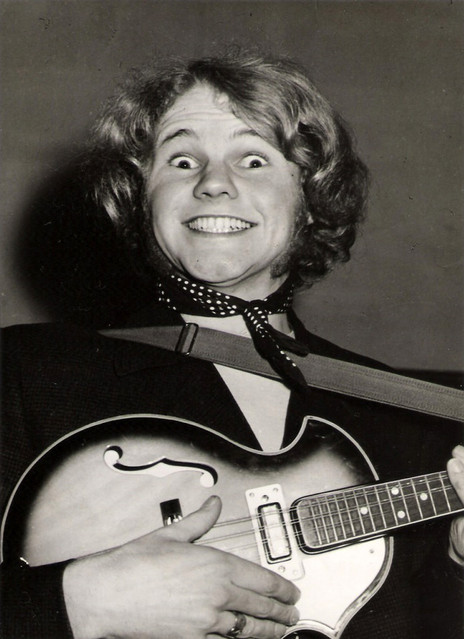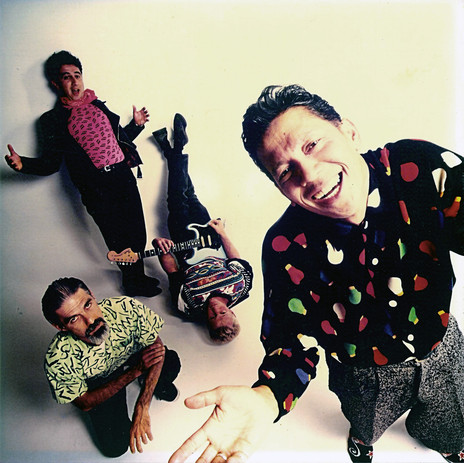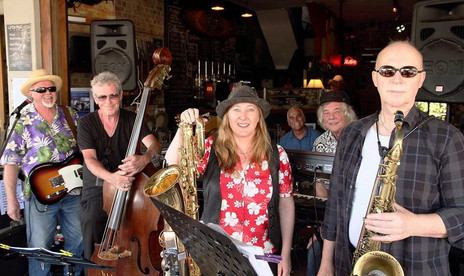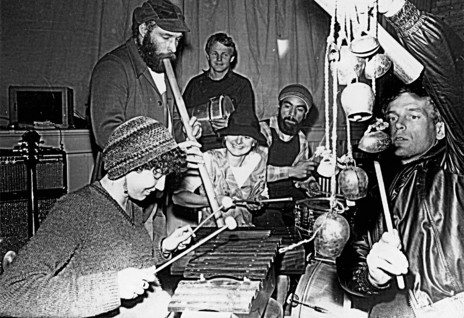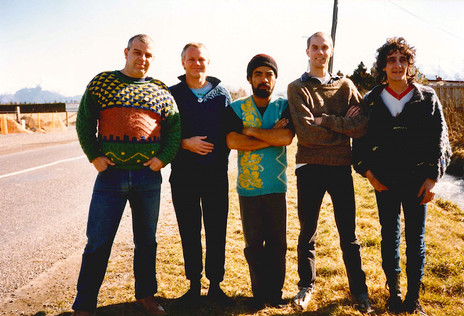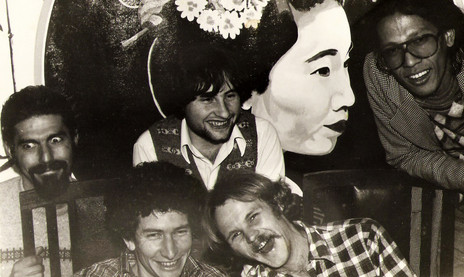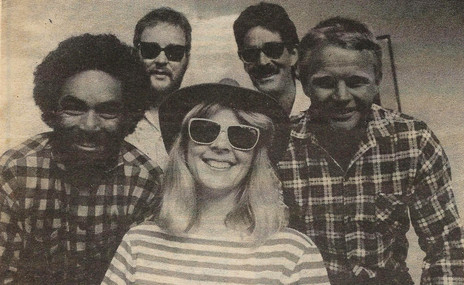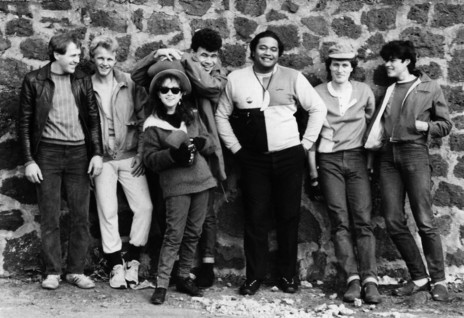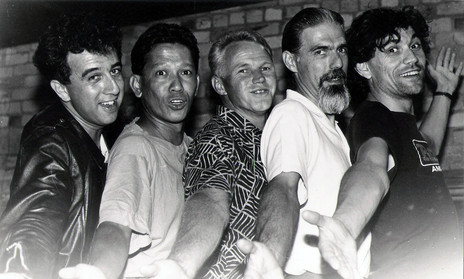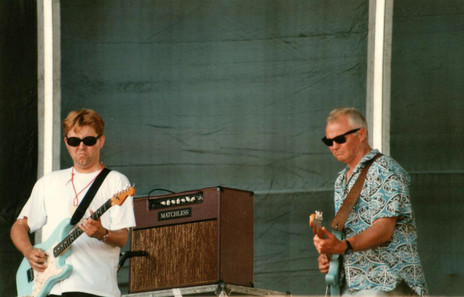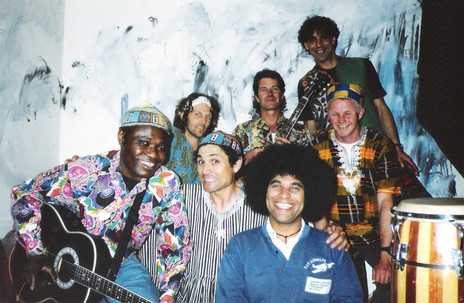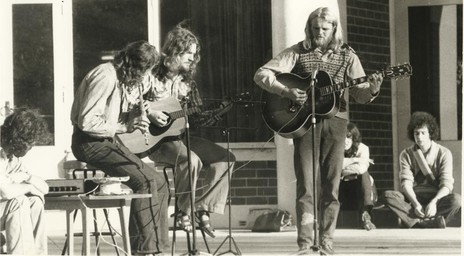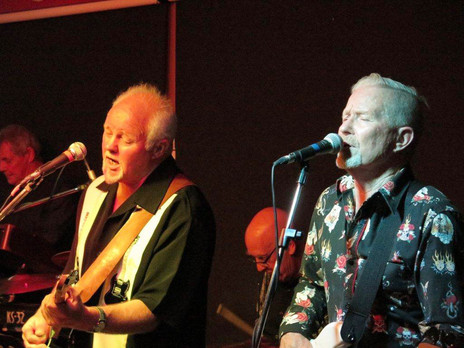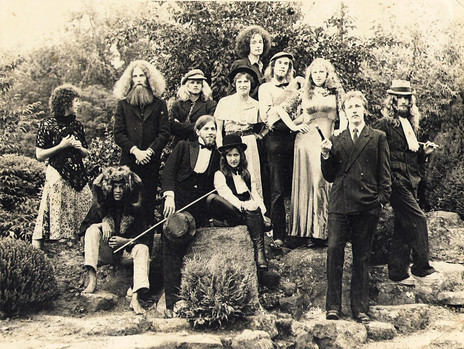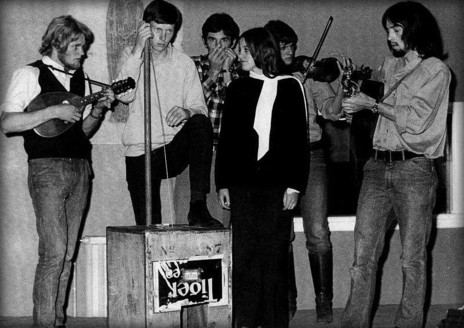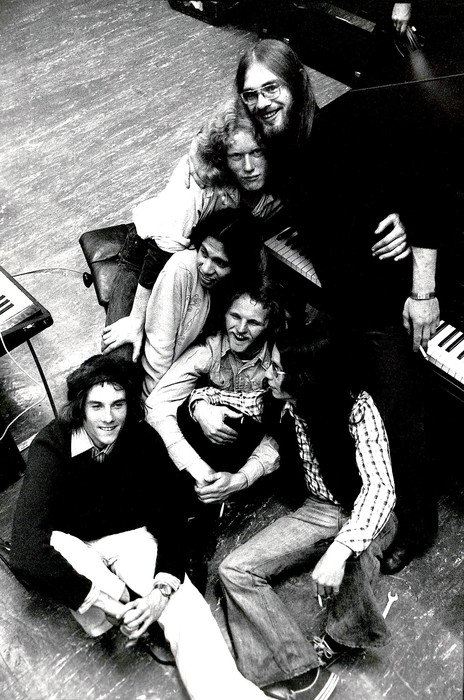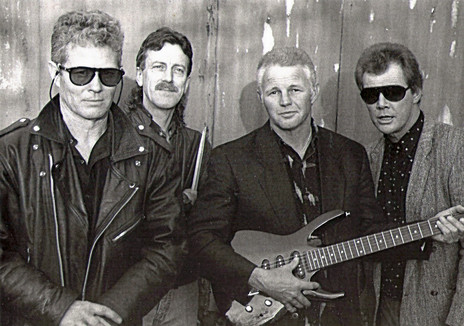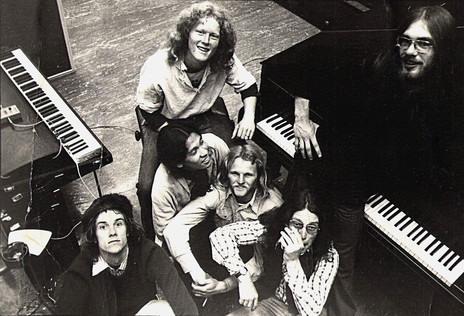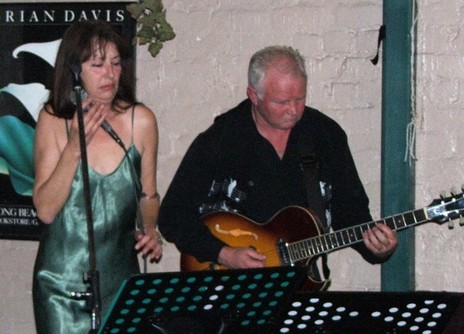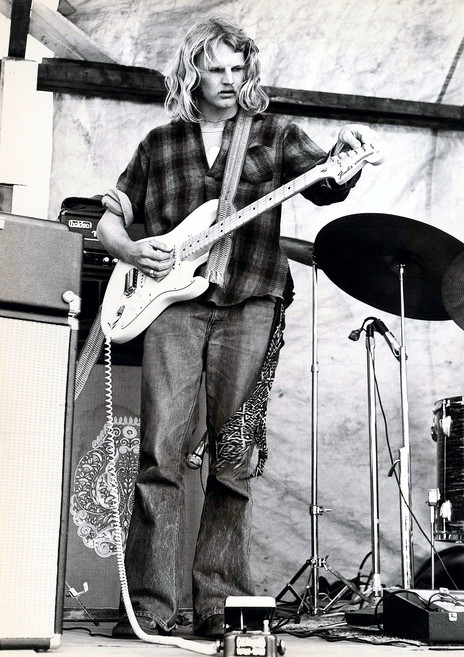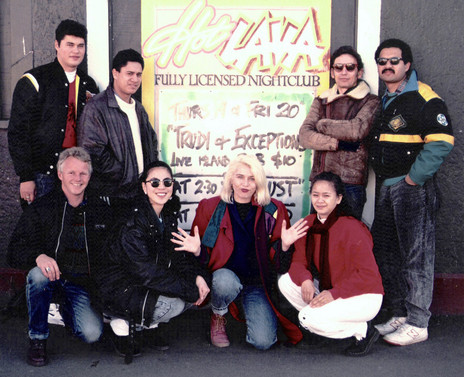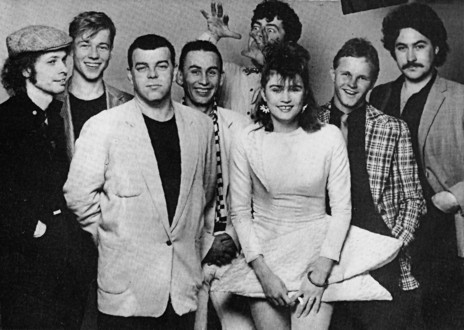At age 15, Baird’s parents put a disappointing halt to the piano lessons so that he could concentrate on his School Certificate examinations. By way of consolation, he was given an acoustic guitar for Christmas and a whole new world was opened up. Later, under the tutelage of David Loomes, he studied classical guitar and passed the Royal School of Music fourth grade guitar exam but he didn’t pursue further formal training. “I really just wanted to learn some songs to play at parties!”
While at school Baird joined an acoustic jug band, Funky Tunk Broadway
Baird began playing with schoolmates who shared his growing interest in folk music and country blues, leading to an all-acoustic jug band, Funky Tunk Broadway (later renamed Truffaut Memorium), formed in 1968. Baird played mandolin. To assure themselves of regular performances, the band founded the South Canterbury Folk Music Club, meeting monthly on a Sunday evening; guest performers from further afield included New Zealand folk music archivist Phil Garland and Dave Calder of The Hamilton County Bluegrass Band.
“Guest acts would be booked from either the Christchurch Banks Peninsula folk club or the Dunedin folk music club. We paid their train fares and billeted them with our families but our jug band always got to play the first set!” In return, Funky Tunk Broadway was invited to play at the Banks Peninsula and Dunedin folk clubs.
Given South Canterbury’s relatively small pool of musicians, Baird’s next band made for an odd line-up: “I was asked by some other friends to play electric mandolin in the Union Blues Soul Band. They’d had a falling out with their sax player, Tim Atkinson, still a lifelong friend, and got me on board to play Geno Washington and Motown horn lines on electric mandolin!”
In 1970 the band bravely crossed the Tasman, from Timaru to Sydney, Baird tossing in his 9-5 as a shipping clerk. The Union Blues Soul Band was in disarray within weeks. “I used the last of my savings to make a lay-by down payment on my first Gibson guitar: a J200 acoustic that I still play today. We had hardly any money. Sometimes the weekly food shopping for the flat was down to a bag of rice, cabbage and a packet of Milo.”
Baird was back in Timaru for three months in 1971 but returned to Sydney to reunite with an Australian girlfriend. Life was no easier second time around, just a handful of solo and duo gigs at wine bars and university venues; the duo featured a flautist. At the end of 1972 he was back in New Zealand, settling in Dunedin.
“I had no work at first, apart from a boring half-day trial as a drill-press operator in an engineering shop, so I advertised for individual guitar tuition and I attracted enough pupils to get by.” One of those pupils was future New Zealand cricket captain and coach John Wright.
There were occasional solo performances at the Otago folk clubs and many jam sessions, new friends, new associations. Craig Johnston, later of Mother Goose, invited Baird to join a covers band called Lodestone, regulars at the Captain Cook Tavern. All he needed was an electric guitar.
“My friend Hamin Derus had recently bought a Fender Telecaster from the rhythm guitarist in local band Stash for $120 and offered to sell it to me for the same price. I bought a second-hand Holden 100-watt head and a quad cabinet and, bingo, I was ready to rock’n’roll!”
Over the summer of 1973-74 Johnston initiated a side project called The Gypsy Roadshow, featuring a full band plus a magician and a cabaret bracket. Performances included an appearance at a Southland borstal and several lunchtime children’s shows. Steve Young – later to co-found Mother Goose with Johnston – was part of the troupe, as was actress Katy Platt. Two members who were to feature in Baird’s future career were vocalist Hamin Derus and bassist John Dodd.
Back in Dunedin, Baird, Derus and Dodd recruited Dunedin folkie Jim Worth as vocalist and rhythm guitarist, and two Australians, keyboardist Steve Kiely and drummer Mick Porter. They later added saxophonist Marcus Shanley, and named themselves Chappaqua, after Conrad Rooks’s cult film.
Chappaqua played the Dunedin haunts, the Captain Cook, university, and at the annual Heads’ Ball at Larnach Castle. At the behest of Gypsy Road Show MC Andy Coleman, Chappaqua became part of a similar-styled troupe, touring the South Island and playing a handful of North Island gigs. For the tour the band purchased a 1950s Bedford bus, nicknamed “Phantom 309” after the Red Sovine/Tom Waits song.
In 1976 Phantom 309 took Chappaqua to Auckland, where Wayne Baird has resided since.
In 1976 Phantom 309 took Chappaqua to Auckland, where Wayne Baird has resided since. They hit the breweries circuit, struggling like most bands of the era. Their final gig was at a Sandy Bay festival in 1977, where they met guitarist Lou Rawnsley (ex-Underdogs). Back in Auckland, Baird, Demus and Rawnsley formed Bamboo (John Dodd, not in the original line-up, joined later). Mike Donnelly was the original drummer, replaced by Steve Garden. There were other line-up changes but Baird, Derus, Dodd and Rawnsley provided the nucleus.
More politically aware than most of their contemporaries, Bamboo regularly supported the Bastion Point occupation, performing at fundraisers and at Bastion Point itself. With Derus – a Malaysian – as the only non-Caucasian, they were one of the first New Zealand bands to perform reggae. Derus, a fine soulful singer, may have been the band’s focal point but the twin guitars of Baird and Rawnsley were much admired by their contemporaries. Rawnsley’s reputation was already well-established but the tasteful licks of Baird were to make him an in-demand sideman in the 1980s. When Derus returned to Malaysia in 1980, having failed to reach a wide audience, Bamboo disbanded.
Baird’s career as a guitar-for-hire began. First up was Hillman Hunter & The Roots Group. Resident at the inner-city Royal International Hotel, the band signalled leader Al Hunter’s return to country music. Baird remained in the line-up for six months before he joined Lou Rawnsley as a member of Hattie (St John) & The Havana Hotshots. The Hotshots recorded an album on the Ode label featuring three Baird compositions.
In 1982 he had a spell in Willie Hona’s nightclub band, teamed up with the Paul Hewitt-Dennis “Choc” Tuwhare rhythm section in the short-lived Smilers, became part of the Origins Dance Theatre (“It was all improvised music, creating soundscapes, the music following the choreography”) and joined one of the hardest working bands of the era, the Neighbours.
The Neighbours toured almost continuously and brought Baird into contact with three people who were to feature significantly in his subsequent career: Sam Ford, Trudi Green and Rick Bryant. His only recording with the band was on their swan-song performance at The Gluepot, the live Vocal At The Local.
In 1984 Baird became a member of Rick Bryant’s Jive Bombers.
Although he wasn’t a member of the original line-up, in 1984 Baird became a member of Rick Bryant’s Jive Bombers, the soul revue which featured up to a dozen members. The Jive Bombers only performed occasionally, but Baird became Bryant’s first-choice guitarist over the next 20 years. He features on both Jive Bombers albums, When I’m With You (1984) and Time (1999); both albums feature a song co-written by Baird and Bryant. Reflecting on the long association, Baird says, “It’s not that difficult to explain – Rick and I share a great love of the same styles of music.”
Meanwhile, the short-lived acts continued – The Famous Five (with Paul Hewitt and “Choc” Tuwhare), Seven Deadly Sins (featuring Fiona McDonald on lead vocals), Gentle Annie (a country group fronted by fiddler Cath Newhook). In 1989 he was back with Sam Ford and Trudi Green in Trudi & The Exceptions and was to remain their on-call guitarist until the couple’s departure to Britain in 1999.
Baird performs on The Exceptions’ 1999 album, Soulahula (co-writing three tracks) and on their 1989 single, ‘You’re On My Mind’, recorded at Mascot Studio with a helping hand from Joe Walsh of The Eagles. Baird says, “It would look good on the CV to say that Joe Walsh produced it but although it was a buzz to be in his company and he did contribute to the arrangement, by day’s end he was too drunk and not making any sense. Engineer Larry Killip really produced it.”
In 1991, continuing his eclectic career, Wayne Baird was exploring African rhythms as a member of Sam Manzanza’s Bobongo Men. Mango Crazy was conceived by Mike Donnelly of Montage Studio and featured vocals by Hamin Derus, back in New Zealand. A cassette-only release, Sweet Reggae (1992) featured 10 tracks, mixing reggae, calypso and soul standards with three originals, and was aimed directly at the Pacific Island market.
There were other recording sessions: the Topp Twins’ Two Timing album, providing slide guitar for Midge Marsden. An unlikely pairing was when he played on Jay Clarkson’s self-titled 1986 solo album. Baird: “I had grown up with Jay’s brother Jeff in Timaru and she, along with Paul Kean and Jane Walker from Toy Love, flatted with me and my family in Mt Eden for a while around 1979-1980. Jay wanted to use my Gibson J200 for some rhythm tracks on the album and I ended up playing some synth on the recording.”
In the mid-1990s Baird played with Bluebird Wine, a country group which gave him the opportunity to play with pedal-steel maestro Glenn R Campbell for the first time. The band also featured bassist Phil Oxenham, with whom Baird worked as a duo named Blue Murder. Del Mundo was a Latin-influenced band led by Bolivian saxophonist Sergio Arellanno. There was a stint with Sonny Day’s Blues News. Shiloh was a duo with Tony Shepherd which did the Auckland RSA circuit. “I was grateful for the work but it was soul-destroying, every set in one key. I had to find something else.”
Playing the RSA CIRCUIT was soul-destroying: Every set in one key. Baird wanted a band that could “swing like hell”
The something else was The Alibis, formed in 1994, who still perform to this day. “There was a something of a swing and jump blues revival at the time and I wanted a band that could swing like hell.”
The Alibis’ nucleus has been Baird, bassist Phil Oxenham and keyboardist Steve Clarke. Drummers have included the long-serving Mike Abbott, Rick Cotter and Paul Hewitt; there has been a plethora of brass players, notably Andrew Clouston, Mike Croft, Annette Hart, Paul Nairn, Chris Neilsen and Rick Roff. Avoiding predictable covers by the likes of Cab Calloway and Louis Jordan, Baird, a longtime student of Americana, plundered his considerable collection of obscure music; drinking songs are particularly prominent.
The Alibis have released two albums – Not Guilty (2000) and On The Rocks (2007) – but it’s as a live act where they really shine. Theirs is exuberant music played by people who clearly enjoy it and none more so than guitarist and occasional vocalist Wayne Baird.
Half a century after he started piano lessons in Timaru, Wayne Baird is one of New Zealand’s most accomplished guitarists. His influences are eclectic, and he is proficient playing country, blues, soul and swing. Looking back over his career, he says, “It’s all been a lot of fun, even when money was hard to come by. Through music I’ve made lifelong friends and I’ve played alongside some great musicians. I don’t intend to stop anytime soon.”
--
After a short illness, Wayne Baird died on 26 December 2023.
